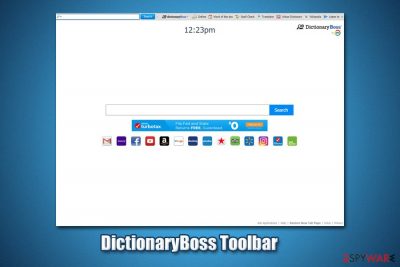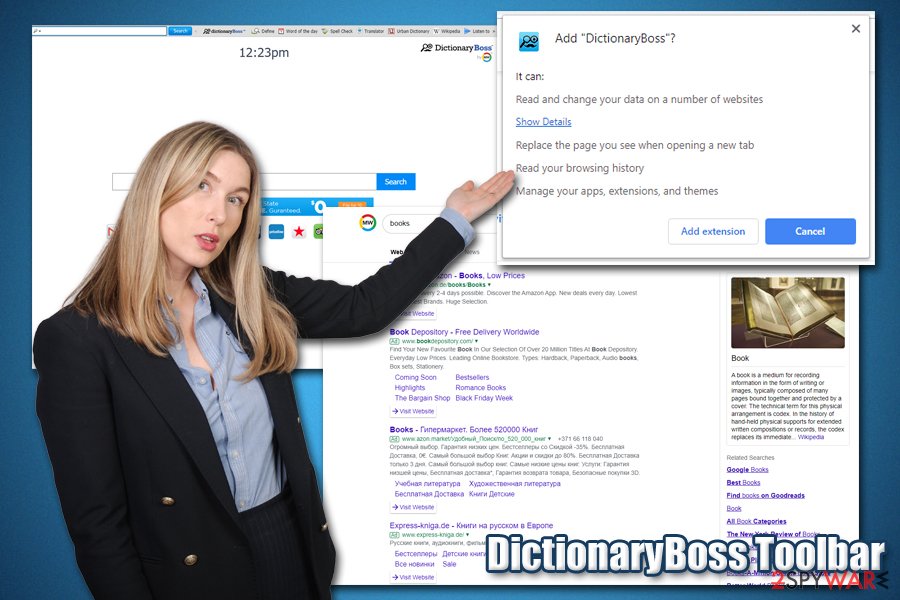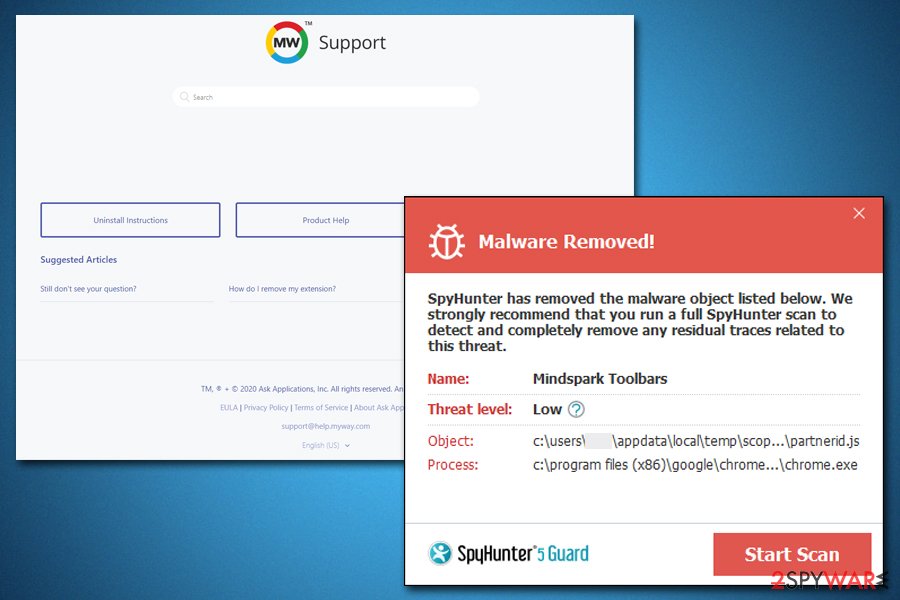DictionaryBoss Toolbar (Removal Instructions) - 2020 update
DictionaryBoss Toolbar Removal Guide
What is DictionaryBoss Toolbar?
DictionaryBoss Toolbar – a useless tool that will spam your Google Chrome browser with ads

DictionaryBoss Toolbar is a browser extension developed by Mindspark Interactive and currently distributed by the Ask Applications. While the app is available on Google Web store, users may often find their web browser homepage, and a new tab changed to MyWay soon after they download and install freeware from third-party sites – this is because developers often use software bundling for its distribution.
From the first sight, DictionaryBoss Toolbar might seem like a good addition to the Google Chrome or another web browser, as it seemingly helps users with using a customized dictionary right from the front page. However, due to deceptive distribution techniques, as well as its browser hijacking[1] capabilities, DictionaryBoss has been categorized as a potentially unwanted program that brings intrusive advertisements and tracks information about users' web browsing habits.
| Name | DictionaryBoss Toolbar |
| Type | Browser hijacker, potentially unwanted program |
| Developer | Mindspark Interactive |
| Publisher | Ask Applications |
| Customized search | MyWay search |
| Distribution | Official Google Web Store, third-party software installers, online advertising |
| Symptoms | Homepage and new tab address altered, a customized MyWay search engine appended, search results filled with sponsored links |
| Risks | Installation of other potentially unwanted programs, personal and anonymous data disclosure |
| Removal | If your browser is appended with a browser extension only, its termination from it can be performed easily; however, if you have a standalone application installed, you will have to get rid of it by following the instructions below |
| Optimization | For best results, we recommend scanning the system with FortectIntego |
As mentioned, DictionaryBoss Toolbar might be installed intentionally via the official store or might be advertised on various websites. Nevertheless, it is worth mentioning that the hijacker might be installed as a standalone application. In such a case, DictionaryBoss Toolbar removal cannot be performed via the browser, but instead, you should follow steps provided at the bottom section.
Talking about functionality, DictionaryBoss Toolbar relies on its dictionary-based features, such as spellcheck and text translation. As it turns out, the function ultimately does not work, making the extension virtually useless.
Additionally, DictionaryBoss Toolbar hijacker includes multiple links to legitimate websites, such as Twitter, YouTube, TripAdvisor, Gmail, Instagram, etc. Nevertheless, keep in mind that this functionality is embedded within all modern browsers, and you can customize it as you please by adding links you are using the most when browsing the web.
Upon installation, users will be forced to search the web via a customized search engine powered by MyWay – a popular search tool used by various potentially unwanted programs. The major difference between using this engine and a reputable one (such as Google.com), is the number of sponsored links that it provides. Users need to scroll down to find the organic[2] results – those that not have been paid for to be at the top.

That being said, DictionaryBoss Toolbar can fundamentally change the way you browse the web, all while the developers benefit from the website visits via the pay-per-click scheme that is commonly used to monetize. Additionally, you might encounter links that bring you to sites of a poor reputation, where you might be persuaded to install other potentially unwanted programs or provide personal information.
Besides directing you to sponsored sites and filling your searches with ads, DictionaryBoss Toolbar will also monitor your online behavior by using various tracking tools, including cookies, web beacons, and other technologies. The collected data may include:
- IP address
- Browser type
- Time stamp
- Keyword queries[3]
- Search terms
- Links clicked, etc.
Keep in mind that DictionaryBoss Toolbar can read and change data on a number of websites that you are visiting, including all dictionaryboss.com sites, anx.tb.ask.com, hp.myway.com, and live.tb.ask.com. Essentially, the information you type, which may include personal details, might be collected for marketing purposes.
All in all, while calling this extension/app a “DictionaryBoss Toolbar virus” is not entirely correct, it is understandable why users might refer to it this way. Besides, some said that had issues when they tried to remove DictionaryBoss from their machines – a common property of PUPs and malware.
Many anti-malware programs might help you get rod of DictionaryBoss Toolbar if you are having problems, although it should not be difficult to do if the browser hijacking capabilities are related to the browser extension – simply right-click on it and pick Remove. For best results, we recommend resetting web browsers and scanning the machine with FortectIntego if system errors are encountered after the removal process.
Some PUP distribution tactics involve deception
DictionaryBoss can be downloaded manually or in a bundle with other applications. If you need it, you can find this program on its official website or other sites that are involved in its distribution. However, it may also show up on your computer after downloading such freeware as PDF Creators, video creators, and similar. If you found DictionaryBoss on your computer out of nowhere, it may look like it infiltrated your machine as a virus.
In reality, you just missed a checkmark, which notified you about this additional download. That’s why you should be very careful when downloading such or similar programs on your computer. Remember, this program is not a virus, but it may cause you several problems, such as the disclosure of your personal information, annoying browser redirects, and other activities.
There are plenty of search tools available – so many that it might even get confusing what to use. Without diving deep into which search provider is the best, we highly recommend sticking to the most popular engines like Google or Bing.

DictionaryBoss removal instructions
When trying to remove DictionaryBoss, you should use these special instructions:
Uninstall programs that are related to DictionaryBoss Toolbar from your computer:
- Click Start → Control Panel → Uninstall a Program.
- When in the Add/Remove Programs/Uninstall a Program, look for DictionaryBoss Toolbar and other programs that are unknown to you.
- Click Uninstall and then OK to save the changes.
Reset Google Chrome:
- Open Google Chrome, click on the menu icon (top right corner) and select Tools → Extensions.
- Here, select unfamiliar plugins (DictionaryBoss Toolbar, MyWay, MyWebSearch, etc.) and select trash icon to delete these entries.
- In order to change your homepage, click on menu icon, choose Settings -> On startup section → set pages.
- Here, eliminate myway.com by clicking on the “X” and enter your preferred website.
You may remove virus damage with a help of FortectIntego. SpyHunter 5Combo Cleaner and Malwarebytes are recommended to detect potentially unwanted programs and viruses with all their files and registry entries that are related to them.
Getting rid of DictionaryBoss Toolbar. Follow these steps
Uninstall from Windows
Instructions for Windows 10/8 machines:
- Enter Control Panel into Windows search box and hit Enter or click on the search result.
- Under Programs, select Uninstall a program.

- From the list, find the entry of the suspicious program.
- Right-click on the application and select Uninstall.
- If User Account Control shows up, click Yes.
- Wait till uninstallation process is complete and click OK.

If you are Windows 7/XP user, proceed with the following instructions:
- Click on Windows Start > Control Panel located on the right pane (if you are Windows XP user, click on Add/Remove Programs).
- In Control Panel, select Programs > Uninstall a program.

- Pick the unwanted application by clicking on it once.
- At the top, click Uninstall/Change.
- In the confirmation prompt, pick Yes.
- Click OK once the removal process is finished.
Delete from macOS
Remove items from Applications folder:
- From the menu bar, select Go > Applications.
- In the Applications folder, look for all related entries.
- Click on the app and drag it to Trash (or right-click and pick Move to Trash)

To fully remove an unwanted app, you need to access Application Support, LaunchAgents, and LaunchDaemons folders and delete relevant files:
- Select Go > Go to Folder.
- Enter /Library/Application Support and click Go or press Enter.
- In the Application Support folder, look for any dubious entries and then delete them.
- Now enter /Library/LaunchAgents and /Library/LaunchDaemons folders the same way and terminate all the related .plist files.

Remove from Microsoft Edge
Delete unwanted extensions from MS Edge:
- Select Menu (three horizontal dots at the top-right of the browser window) and pick Extensions.
- From the list, pick the extension and click on the Gear icon.
- Click on Uninstall at the bottom.

Clear cookies and other browser data:
- Click on the Menu (three horizontal dots at the top-right of the browser window) and select Privacy & security.
- Under Clear browsing data, pick Choose what to clear.
- Select everything (apart from passwords, although you might want to include Media licenses as well, if applicable) and click on Clear.

Restore new tab and homepage settings:
- Click the menu icon and choose Settings.
- Then find On startup section.
- Click Disable if you found any suspicious domain.
Reset MS Edge if the above steps did not work:
- Press on Ctrl + Shift + Esc to open Task Manager.
- Click on More details arrow at the bottom of the window.
- Select Details tab.
- Now scroll down and locate every entry with Microsoft Edge name in it. Right-click on each of them and select End Task to stop MS Edge from running.

If this solution failed to help you, you need to use an advanced Edge reset method. Note that you need to backup your data before proceeding.
- Find the following folder on your computer: C:\\Users\\%username%\\AppData\\Local\\Packages\\Microsoft.MicrosoftEdge_8wekyb3d8bbwe.
- Press Ctrl + A on your keyboard to select all folders.
- Right-click on them and pick Delete

- Now right-click on the Start button and pick Windows PowerShell (Admin).
- When the new window opens, copy and paste the following command, and then press Enter:
Get-AppXPackage -AllUsers -Name Microsoft.MicrosoftEdge | Foreach {Add-AppxPackage -DisableDevelopmentMode -Register “$($_.InstallLocation)\\AppXManifest.xml” -Verbose

Instructions for Chromium-based Edge
Delete extensions from MS Edge (Chromium):
- Open Edge and click select Settings > Extensions.
- Delete unwanted extensions by clicking Remove.

Clear cache and site data:
- Click on Menu and go to Settings.
- Select Privacy, search and services.
- Under Clear browsing data, pick Choose what to clear.
- Under Time range, pick All time.
- Select Clear now.

Reset Chromium-based MS Edge:
- Click on Menu and select Settings.
- On the left side, pick Reset settings.
- Select Restore settings to their default values.
- Confirm with Reset.

Remove from Mozilla Firefox (FF)
Remove dangerous extensions:
- Open Mozilla Firefox browser and click on the Menu (three horizontal lines at the top-right of the window).
- Select Add-ons.
- In here, select unwanted plugin and click Remove.

Reset the homepage:
- Click three horizontal lines at the top right corner to open the menu.
- Choose Options.
- Under Home options, enter your preferred site that will open every time you newly open the Mozilla Firefox.
Clear cookies and site data:
- Click Menu and pick Settings.
- Go to Privacy & Security section.
- Scroll down to locate Cookies and Site Data.
- Click on Clear Data…
- Select Cookies and Site Data, as well as Cached Web Content and press Clear.

Reset Mozilla Firefox
If clearing the browser as explained above did not help, reset Mozilla Firefox:
- Open Mozilla Firefox browser and click the Menu.
- Go to Help and then choose Troubleshooting Information.

- Under Give Firefox a tune up section, click on Refresh Firefox…
- Once the pop-up shows up, confirm the action by pressing on Refresh Firefox.

Remove from Google Chrome
Delete malicious extensions from Google Chrome:
- Open Google Chrome, click on the Menu (three vertical dots at the top-right corner) and select More tools > Extensions.
- In the newly opened window, you will see all the installed extensions. Uninstall all the suspicious plugins that might be related to the unwanted program by clicking Remove.

Clear cache and web data from Chrome:
- Click on Menu and pick Settings.
- Under Privacy and security, select Clear browsing data.
- Select Browsing history, Cookies and other site data, as well as Cached images and files.
- Click Clear data.

Change your homepage:
- Click menu and choose Settings.
- Look for a suspicious site in the On startup section.
- Click on Open a specific or set of pages and click on three dots to find the Remove option.
Reset Google Chrome:
If the previous methods did not help you, reset Google Chrome to eliminate all the unwanted components:
- Click on Menu and select Settings.
- In the Settings, scroll down and click Advanced.
- Scroll down and locate Reset and clean up section.
- Now click Restore settings to their original defaults.
- Confirm with Reset settings.

Delete from Safari
Remove unwanted extensions from Safari:
- Click Safari > Preferences…
- In the new window, pick Extensions.
- Select the unwanted extension and select Uninstall.

Clear cookies and other website data from Safari:
- Click Safari > Clear History…
- From the drop-down menu under Clear, pick all history.
- Confirm with Clear History.

Reset Safari if the above-mentioned steps did not help you:
- Click Safari > Preferences…
- Go to Advanced tab.
- Tick the Show Develop menu in menu bar.
- From the menu bar, click Develop, and then select Empty Caches.

After uninstalling this potentially unwanted program (PUP) and fixing each of your web browsers, we recommend you to scan your PC system with a reputable anti-spyware. This will help you to get rid of DictionaryBoss Toolbar registry traces and will also identify related parasites or possible malware infections on your computer. For that you can use our top-rated malware remover: FortectIntego, SpyHunter 5Combo Cleaner or Malwarebytes.
How to prevent from getting browser hijacker
Stream videos without limitations, no matter where you are
There are multiple parties that could find out almost anything about you by checking your online activity. While this is highly unlikely, advertisers and tech companies are constantly tracking you online. The first step to privacy should be a secure browser that focuses on tracker reduction to a minimum.
Even if you employ a secure browser, you will not be able to access websites that are restricted due to local government laws or other reasons. In other words, you may not be able to stream Disney+ or US-based Netflix in some countries. To bypass these restrictions, you can employ a powerful Private Internet Access VPN, which provides dedicated servers for torrenting and streaming, not slowing you down in the process.
Data backups are important – recover your lost files
Ransomware is one of the biggest threats to personal data. Once it is executed on a machine, it launches a sophisticated encryption algorithm that locks all your files, although it does not destroy them. The most common misconception is that anti-malware software can return files to their previous states. This is not true, however, and data remains locked after the malicious payload is deleted.
While regular data backups are the only secure method to recover your files after a ransomware attack, tools such as Data Recovery Pro can also be effective and restore at least some of your lost data.
- ^ Browser hijacking. Wikipedia. The free encyclopedia.
- ^ Ramona Sukhraj. Organic search vs paid search: What's the difference in 2020?. Impact. Marketing agency.
- ^ Elisa Gabbert. Keywords vs. Search Queries: What's the Difference?. WordStream. Online advertising made easy.























